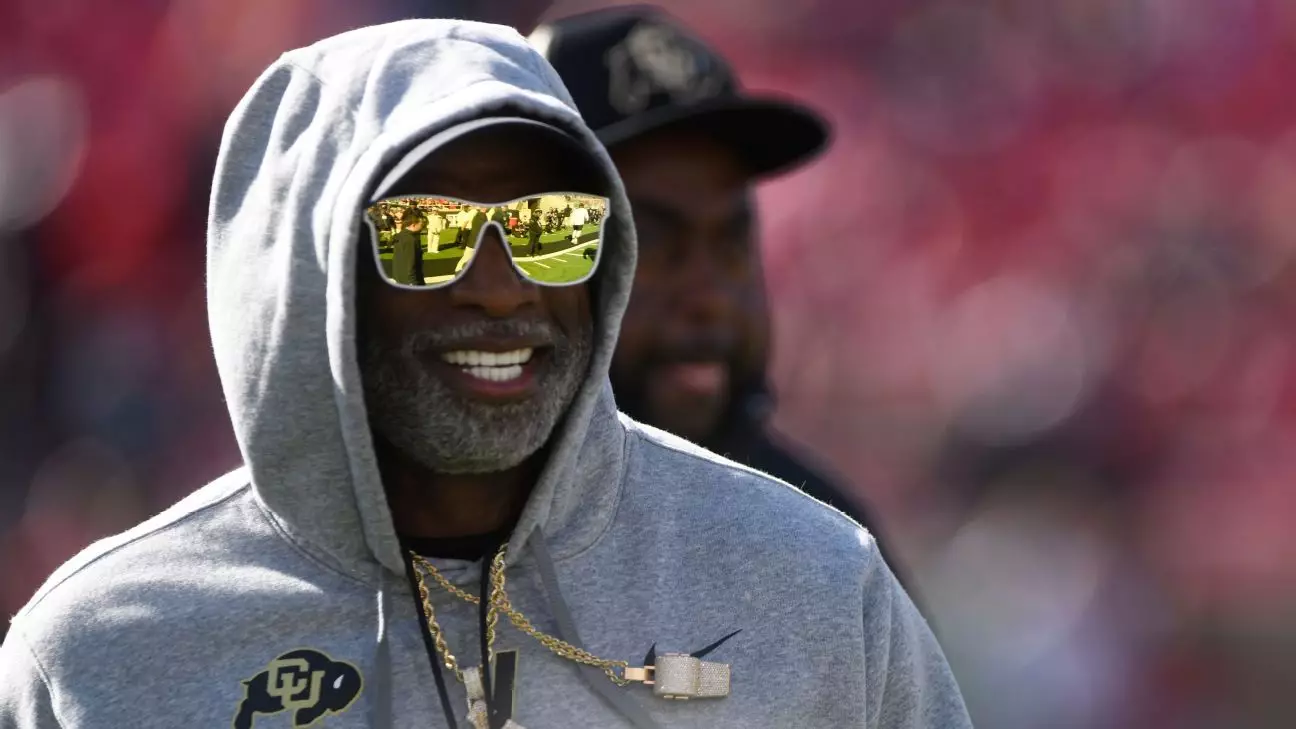Deion Sanders, known widely as “Coach Prime,” has taken the college football world by storm. With a newly minted five-year, $54 million contract extension, he is not only among the highest-paid coaches in the nation but also symbolizes a shift in how we perceive the role of a college football coach today. The intricacies of this deal, particularly its staggering financial implications, compel us to examine the growing commodification of college athletics and question how this affects student-athletes and educational institutions alike.
In the face of a program that struggled with a dismal 1-11 record before his arrival, Sanders has showcased an uncanny ability to reinvigorate college football at the University of Colorado. For context, leading the Buffaloes to 13 victories, including a much-celebrated bowl berth and substantial increases in viewership, is a remarkable achievement. But while the financial metrics associated with his coaching tenure are impressive, one must also ponder the broader implications of such lucrative contracts, especially in a landscape where academic integrity and the prioritization of education often clash with the commercial interests of sports.
Money Talks: The Economics of College Football
As Sanders walks a path leading to a $10 million salary in 2025, one can’t ignore the glaring contradictions present in the college athletic world. The discrepancy between the millions earned by head coaches and the financial limitations experienced by the student-athletes themselves is disconcerting. We are living in an era where universities rake in significant profits, sometimes exceeding $100 million, but student-athletes continue to operate under restrictions regarding compensation for their own success.
The financial explosion linked to Sanders’ leadership rolls into the local economy of Boulder as well, where the football program’s prominence generated nearly $150 million in total regional economic impact last season. A spike in college applications—particularly among underrepresented populations—suggests that the appeal of a winning football program extends beyond the field, promising opportunities for previously marginalized communities. Yet, should a sport viewed primarily as entertainment become such a focal point of academic reputation?
The notion of colleges primarily being institutions of learning seems to erode when the conversation pivots towards the dollars associated with athletic success. It’s a complex web that raises ethical questions about the priorities of educational institutions in modern times.
Redefining Leadership and Impact
Sanders’s contract extends beyond dollars and sense; it signifies a cultural shift. By pledging to foster not just athletic prowess but also personal development, Sanders embodies a progressive vision of coaching where life lessons take center stage. His public statements emphasize the importance of crafting young men of character and integrity—an admirable vision that contrasts sharply with prevalent narratives of greed and exploitation in collegiate sports.
However, can we take this promise at face value? The influx of revenue suggests a system increasingly built on success at any cost. While Sanders’s focus on holistic development of students is commendable, institutions must balance this ideal with the realities of a system designed to generate substantial profits. The duality poses existential questions: How can we create an environment where excellence in sports complements academic growth without undermining the educational mission?
The Future of College Sports
As we embrace the era of “Coach Prime” and his burgeoning contract, we simultaneously stand at a crossroads for college athletics. The potential outcomes are both exhilarating and concerning. The benefits of increased youth engagement, application growth, and community pride associated with a successful football program are undeniable—yet, they cannot come at the cost of the student-athlete’s well-being and educational experience.
With Sanders at the helm, Colorado has positioned itself as a powerhouse in college football, but it is essential for all stakeholders—universities, fans, and players—to remain vigilant. This contract represents not just a milestone for Sanders, but an opportunity for dialogue surrounding the ethics of our college athletic systems. In the pursuit of greatness, let us not forget that the journey should be as enriching as the destination.
By holding ourselves to higher standards, we can ensure that the focus on coaching transcends mere financial gain and genuinely contributes to the growth of young leaders who can make a difference, both in sports and in society.


Leave a Reply